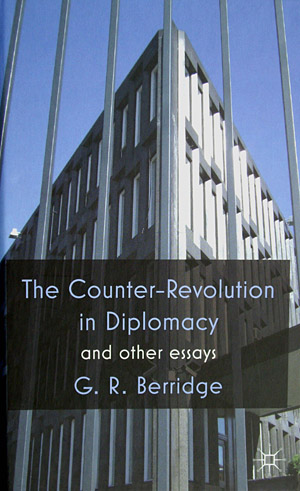The Counter-Revolution in Diplomacy and Other Essays
(Palgrave Macmillan: Basingstoke, 2011)
The title essay of this collection is a refreshed version of an article first published in the Italian journal Quaderni di Scienza Politica in 2005.The book also includes three essays based on new research: ‘Specific reciprocity and the 105 Soviet spies’, ‘Home or away?’ and ‘Wartime embassies’.
Abstracts of each essay can be read on the Springer Link website here.
Reviews
From the Springer Link page: ‘[This book] showcases a master in the analysis of modern diplomacy at work. All of the essays are compellingly, wittily and, at times, beautifully written in a way which makes them accessible to the expert and general reader alike. The quality of the book is first class.’ Paul Sharp, Professor of Political Science, University of Minnesota Duluth, USA.
From Diplomacy & Statecraft, vol. 22(4), 2011
After moving the focus of his research towards diplomacy in the late 1980s, and founding the Leicester Centre for the Study of Diplomacy in 1994, G. R. Berridge established himself as an early and one of the principal contributors to the study of diplomacy. His writings cover diplomatic theory and practice, and range from ancient history to the present day. One can safely say that no student of diplomacy can go without reading at least one of his many books, most of which are single-authored. …
The author presents himself as a fine storyteller who manages to capture and surprise his audience. The narrative essays are filled with details and historical anecdotes that explain, support, or embellish the story. This makes for pleasant reading, wherein the reader more than once imagines himself in another world and time, and would be forgiven for forgetting about the actual academic value of the work. At the same time, however, the less experienced reader in diplomacy would have benefitted from elaboration on certain terms that are regularly used but not explained … Also, some may have wished for more analysis and (theoretical) reflections on specific points. … A more general question that arises when reading this and several other essays, concerns the aim of the writings, and the point(s) that the author is alluding to. More broadly, why did Berridge select these ten essays for the collection? Indeed, it would have been of interest if the preface had included a few words on how the essays do, or do not, form a coherent whole. …
Overall, this collection of lucidly presented essays provides the reader with very pleasant reading and valuable food for thought. Recalling Hedley Bull’s juxtaposition of diplomacy and war, consider for example the closing sentence of the final chapter on wartime embassies: “it is probably true, and—if so—a rich irony of the history of diplomacy, that embassies are never so important as in war” (p. 192). Berridge is to be commended for contributing this unconventional volume to the study of diplomacy. In the eyes of this reviewer at least, the essays—individually and as a whole—make a successful contribution to a stated long-term goal of the author himself: to encourage the study of diplomacy. Maaike Okano-Heijmans, Netherlands Institute of International Relations “Clingendael”.



